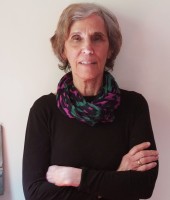Elinor Ochs
Elinor Ochs is Distinguished Research Professor of Anthropology at University of California, Los Angeles. Drawing upon fieldwork in Madagascar, Samoa, Italy and the United States, she documents durative and fluid dispositions and practices undergirding becoming competent communicators and actors across the lifespan, settings, and communities. Her research on language socialization, narrative, and emotion bridges linguistic, psychological, and medical anthropology. She has examined quotidian life-worlds of typically developing children and children with autism spectrum disorders. Ochs directed the UCLA Sloan Center on Everyday Lives of Families (2001-2010), which analyzed how social class configures communication, connectedness, childcare, health, commensality, leisure, work, and consumerism. Ochs also probes how embodied communication among adults evokes thinking, feeling and acting. In this regard she has documented how communication in science laboratories influences how scientists problem-solve. Selected honors include MacArthur Fellow, American Academy of Arts and Sciences Fellow, John Simon Guggenheim Fellow, Honorary Doctorate Linkoping University (Sweden), and President of Society for Linguistic Anthropology and American Association for Applied Linguistics.
Elinor Ochs joins the Paris IAS in September 2025 for a one-month writing residency.
Research topics
Entanglements of language and experience; children’s language socialization; narrative problem-solving in everyday life and science; embodied communication and disability.
How Listening to What Others Are Saying Fell out of Grace in Human Development
This project uses long ago ethnographic recordings and field notes of Samoan toddlers’ socialization into listening to what others around them are saying. As in other societies, little ones were soothed, informed, prompted, teased, shamed, reprimanded and otherwise addressed by sibling and adult caregivers. Yet, these exchanges tended to be multiparty rather than dyadic, transpiring in the midst of ratified overhearers who participated as moral audience. In short, young Samoan children were expected to overhear others and be overheard by extended family and community members. Before the age of five they were capable of conveying messages from others to titled persons using a lexically distinct respect register. These messages were not parroted imitations of an adult’s message. Rather, the children transformed everyday Samoan words into respect vocabulary that they acquired largely through overhearing exchanges on formal and informal occasions.
The importance and vitality of overhearing in this Samoan community echoes communicative skills expected of young children across an array of social groups that are largely tangential to post-industrial liberal economies. In such communities, orienting infants and toddlers as overhearers of surrounding conversational exchanges is the linguistic component of caregiving practices that promote observational skills critical to what Rogoff et al (2003) call a child's 'intent participation' in the social environment. The point to emphasize here is that the infant or toddler is a 'ratified' participant in the social scene and expected to hone knowledge and skills through overhearing and observing.
Over the last several decades overhearing has fallen out of grace as a developmental skill. Quantitative studies conducted largely in nuclear family households in post-industrial countries overwhelmingly indicate that dyadic parent-child conversation is the lucrative path to linguistic and communicative competence and educational success. That is, engaging a toddler or even an infant as speaker and addressee surpasses child as overhearer in the language acquisition race. This is not surprising, given the extensive child-centered, individualized, cognitive and emotional 'talk labor' expected of neoliberal parents. It is also not surprising that children socialized into democratizing parent-child dialogue would carry this symbolic capital into schools and the labor market.
Key publications
Elinor Ochs. “Thinking in between Disciplines”. Annual Review of Anthropology 51, pp. 1-15, 2022.
Elinor Ochs,Tamar Kremer-Sadlik. “Talk Labour and Doing Being Neoliberal Mother” Gender and Language, 15, pp. 262-276, 2021.
Elinor Ochs, Bambi Schieffelin. "The Theory of Language Socialization" in The Handbook of Language Socialization. Alessandro Duranti, Elinor Ochs et Bambi Schieffelin (eds.) Malden, MA: Wiley Blackwell, pp. 1-22, 2011.
|
Online conference by Elinor Ochs (UCLA, USA) as part of the "Paris IAS Ideas" series |
|
|
|
|


